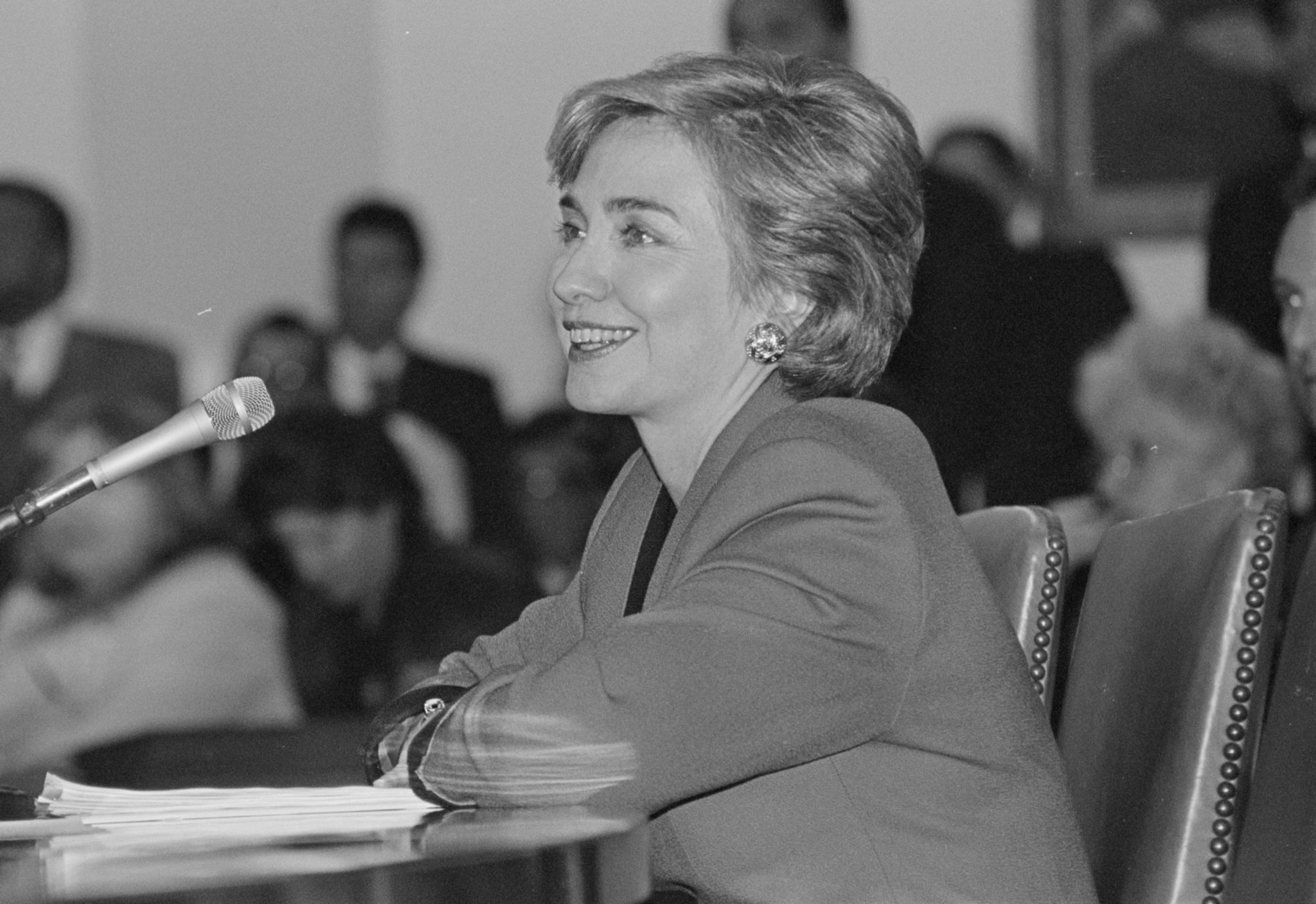What can be said about Hillary Rodham Clinton that hasn’t already been said? After all, Amazon suggests that approximately 700 books have been written about her and Bill. But that didn’t scare Curtis Sittenfeld, whose latest novel, Rodham, tackles the imagined inner life of one of the world’s most discussed human beings.
In the book, Sittenfeld—a Minneapolis-based writer and former Washingtonian who once taught English at DC’s St. Albans—decided to ask a provocative question: What if Hillary had never married Bill? The result is a vivid alternate history in which Hillary’s different life choices are borne out in fascinating ways.
Rodham is a sequel of sorts to Sittenfeld’s 2008 book, American Wife, a fictional first-person account of the life of former First Lady Laura Bush. But this time, the parallel-universe nature of the premise adds a significant wrinkle, raising intriguing questions about fate and chance. “I’m endlessly fascinated by the ideas of inevitably versus free will,” Sittenfeld says. “Do we all have potential other lives? What about our lives is inevitable and what’s arbitrary?”
Where did the idea for this book come from?
There were a few things, but I found myself thinking about how, for kids who were in elementary school during the 2016 election, a lot of them had no idea who Bill Clinton was, let alone that he had been President, let alone that there was all this baggage attached to him. So I started to think: What if adults had that sort of absence of baggage that children have in how we perceive Hillary Clinton?
Did you have any of that baggage yourself?

I graduated from high school in 1993, and I remember when I first read about Hillary Clinton and thinking she sounded really interesting. That’s, like, 1992. Then around 2007, I was writing my third novel, American Wife, which is sort of a fictional retelling of the life of Laura Bush. For that, I read Hillary Clinton’s memoir, Living History, just to read another First Lady’s perspective. I started thinking about how I once had a favorable impression of both Bill and Hillary Clinton, and over the years I had a much less favorable opinion of them.
Why?
Well, that’s what reading that book made me think about. Has my opinion of Hillary Clinton shifted? Has it become more negative because of things she’s done? Or because of things I’ve read about her that actually may or may not be grounded in fact? It was this eye-opening experience for me at that time. Initially, as a high-school student, I thought she seemed really cool and smart, and then it just felt like, wow, a lot of scandals have attached themselves to both Clintons. Then I came out the other side of that and thought, “Wait, I think I was right the first time.”
Once I had the idea to write this alternate history, like 400 pages of thoughts about Hillary Clinton came flowing out. The question for me was: What’s it like to be Hillary Clinton? Or to be Hillary Rodham?
I put the book down with a feeling that I understood Clinton better than I’ve ever understood her. I mean, this isn’t something I’d necessarily want in print, but . . .
Don’t let me stop you.
. . . reading about the main character’s diarrhea, for instance, before a debate . . .
Right, right. It happens to all of us!
I don’t know if this was the intention, but I walked away with the idea, certainly incorrect, that now I really “know” her.
That’s my goal. Because I do think there’s something strange about this widespread idea that Hillary has been part of our public life and political life for 30 years, and yet many people feel like they don’t know her. One of my goals is to make people think, “How does the world look to her?” Not “How does she look to us?” I also should say I did a ton of research, but the great majority of the book is made up. It’s not Hillary Clinton’s memoir—it’s my novel. Definitely artistic license is taken, like on every single page—probably in every single paragraph.
Could Bill have won the presidency without her? You lay out, in what’s basically a one-paragraph thesis, why America needed Hillary in order to accept Bill.
There’s this joke where Bill and Hillary stop at a gas station and a man comes out and pumps their gas. They keep driving, and Hillary says, “Oh, I used to date that guy.” And Bill says something like, “Well, aren’t you glad that you married me and now you’re First Lady?” And she says, “Oh, if I had married him, he would have been President.”
I think a lot of views of them are simplistic, and I’m drawn to writing novels because they allow you to examine the full complexity of human beings. I would never try to lay out a case that Bill Clinton would not have become President without Hillary. Some people will say they reinforced some of each other’s worst impulses, and then some will say they brought out the best in each other.
If someone heard the premise of the book, they could say, like, “Whew, you clearly don’t like Bill Clinton.” But it’s much more complicated than that. I certainly understand why she married him. And I feel like if it were 1975 and I were Hillary and if Bill Clinton really wanted to marry me, there’s about a 99-percent chance I would say yes.
I was struck by how much emphasis there was on the portrait of a young Hillary as a sexual being. Your writing considers the cultural archetype that portrays her as androgynous. Did you want us to see her as distinctly sexual?
I don’t think I go into writing with a particular agenda or a wish to prove a particular point. So in that sense, no. I mean, presumably she has some sexual side the public is not privy to. I would see it as appropriate that the public does not really know, doesn’t have a handle on, Hillary’s sexual anything. That just seems like a reflection of human or political protocol and not a reflection of Hillary.
I do feel that she occupies a unique spot in the public imagination. One time, there was this news cycle, when she was a senator, that she was showing cleavage on the Senate floor. It was such a nothing story—to me, it seemed like it was about people’s unfamiliarity with women in positions of power and women senators, because she was wearing something totally appropriate for a senator to wear.
I find most of the public discourse on her to be ridiculous. It’s like a conversation that the culture is having with itself, and it’s not thinking of her as a very specific individual. The conversation doesn’t own up to how much we think we’re talking about her specifically, but we’re really talking about gender.
Even though you may not know it from the end result, I did try to approach the question of sex delicately. If the question is, like, did you feel a little weird about including it? Yes, of course I felt a little weird about including it, and I also felt there were reasons to do it.
Going back to your point about young people: To some of them, she’s become this anti-fun, matronly stereotype. It’s wormed its way into the culture.
I think there are a lot of perspectives on her. It’s almost that optical illusion: From this angle, a beautiful young woman! And from this angle, a hag! I almost feel like when different people look at Hillary, they’re almost literally not seeing the same person. To many people, she’s a feminist icon, and I understand that she has a huge number of critics. I don’t think I was writing to persuade her critics to think differently. I’m not sure that’s my goal, or my responsibility, at this point.
I won’t ruin it for people, but Trump factors into the book with a presence that’s seen and unseen. The message seems to be that our worlds are more tenuous than we can imagine—and that even our enemies today, if things had gone differently, might not be quite so adversarial.
I do think sometimes that if certain things had been a little bit different, it could have led to dramatically different outcomes. There are rumors that Bill Clinton encouraged Donald Trump to enter the Republican presidential race. That’s one of many things where I don’t know if it’s true. I suspect you also know that Bill and Hillary were at Donald Trump’s wedding to Melania, which is also kind of mind-bending. I think about parallel universes and chance and fate and inevitably and tenuous connections. I think about all of that.
This interview, which has been edited and condensed, appears in the June/July 2020 issue of Washingtonian.


















